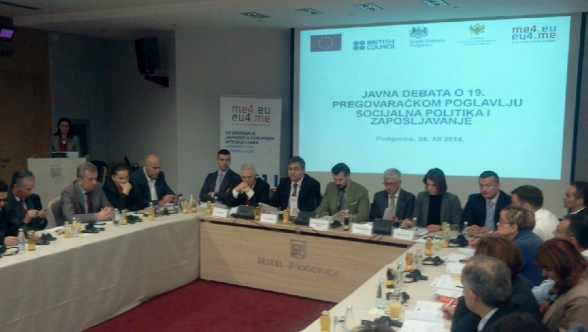Chairperson of the Committee on European Integration Mr Slaven Radunović today has participated in the public debate on Chapter 19 - Social policy and employment. The debate is organised by the Ministry of Foreign Affairs and European Integrations, and in addition to Chairperson Radunović, the following spoke: Chief Negotiator Aleksandar Andrija Pejović, Head of the EU Delegation to Montenegro Mr Mitja Drobnič, Ambassador of the United Kingdom Mr Ian Whitting as well as Director of the Directorate for Labour Market and Employment of the Ministry of Work and Social Welfare Ms Arijana Nikolić-Vučinić.
Chairperson of the Committee Mr Slaven Radunović points out to necessity of strengthening the implementation of laws with regard to creating opportunities for new employments. He says that persons with disabilities and RAE population are particularly vulnerable categories, whose social strengthening should be enforced through programmes of employment and training for self-employment. Mr Radunović has also referred to the problem of high youth unemployment, emphasising that the Programme of vocational training provided job opportunity for many Montenegrin university graduates, but that there have been certain problems in its implementation. He concludes that the cooperation of all shareholders is necessary for the purpose of improving this area, with the aim of satisfying workers, employees and countries.
Ambassador Aleksandar Andrija Pejović has presented main aspects of this chapter, stating that social policy and employment are the backbone of the strategy Europe 2020. Mr Pejović particularly points out ubiquity, i.e. relation of this area with chapters 23 and 24 with regard to antidiscrimination and fight against corruption, and with chapter 26, in the context of employment of youth and connecting the educational process with labour market.
Head of the EU Delegation Mr Mitja Drobnič says that citizens have direct benefit from this field, through simpler employment, improvement of employment rights and other. Even though the EU sets only basic rules in this area, leaving the policy development to member states, he emphasises that there are certain mandatory rules with regard to prohibition of discrimination on grounds of race and ethnicity, religion and faith, invalidity, age and sexual orientation.
Ambassador Ian Whitting has shared with participants experiences of the United Kingdom, saying that in his country there are different political opinions on establishing balance between the “safety network“ and business encouragement. He adds that the EU share in world economy has been decreasing and that one of the reasons for this is exaggerated regulation.
EU. Ms Arijana Nikolić-Vučinić says that the country has been working on improving the law regarding the issues such as labour disputes, volunteering, rights of persons with disabilities. The initial benchmark for opening this chapter, as she says, is gradual harmonisation of legislation with the EU acquis.
During the debated, interested parties posed questions regarding the rights of persons with disabilities, blind and visually impaired persons and RAE population, and spoke of certain problems in functioning of trade union organisations.









